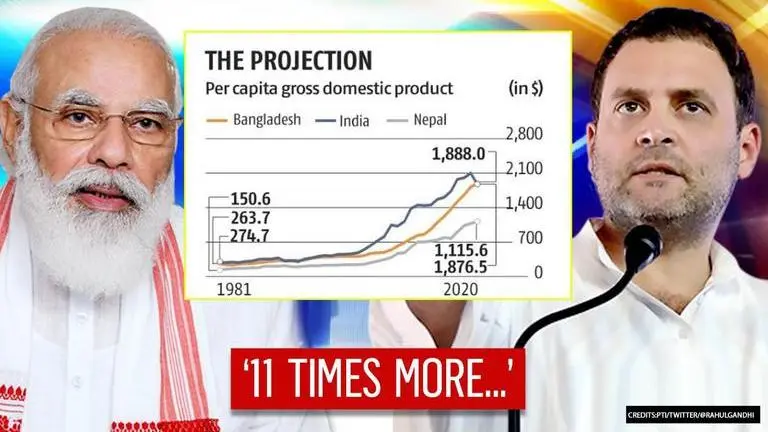Updated 15 October 2020 at 09:35 IST
PPP vs per-Capita: Rahul Gandhi's attack on India-Bangladesh GDP comparison gets response
Govt sources have responded to ex-Congress president Rahul Gandhi's jibe over an IMF report that said India's per capita GDP is set to drop below Bangladesh
- India News
- 3 min read

Former Congress president Rahul Gandhi took a dig at the Centre on Wednesday over IMF growth projections showing Bangladesh closing in on India in terms of per capita GDP this year, describing it as a "solid achievement" of six years of the ruling BJP's "hate-filled cultural nationalism".
'Bangladesh set to overtake India'
"Solid achievement of 6 years of BJP's hate-filled cultural nationalism: Bangladesh set to overtake India," Gandhi said in a sarcastic tweet, accompanied by clapping emojis.
Solid achievement of 6 years of BJP’s hate-filled cultural nationalism:
— Rahul Gandhi (@RahulGandhi) October 14, 2020
Bangladesh set to overtake India.
👏👏👏 pic.twitter.com/waOdsLNUVg
Centre hits back at Rahul Gandhi
Responding to Rahul Gandhi, the Centre has said that India's Gross Domestic Product (GDP) in terms of Purchasing power parity (PPP) in 2019 was 11 times more than Bangladesh.
News agency ANI quoting government sources said that in 2019, India's GDP in purchasing parity terms was 11 times more of Bangladesh while the population was 8 times more. In purchasing power parity terms, India's per capita GDP in 2020 is estimated by IMF at $6284 compared to $5139 for Bangladesh.
Advertisement
IMF has estimated India's GDP to grow at 8.8% in 2021, twice the rate of Bangladesh at 4.4%. Under the present government, per capita GDP increased from Rs 83,091 in 2014-15 to Rs 1,08,620 in 2019-20 - an increase of 30.7%. Under UPA 2, it had increased by 19.8%, the government sources said.
Indian economy to contract by 10.3% in 2020
The IMF on Tuesday said the Indian economy, severely hit by the coronavirus pandemic, is projected to contract by a massive 10.3 per cent this year. However, the country is likely to bounce back with an impressive 8.8 per cent growth rate in 2021, thus regaining the position of the fastest-growing emerging economy, surpassing China's projected growth rate of 8.2 per cent, the IMF said in its latest World Economic Outlook report.
Advertisement
READ | IMF urges countries to build strong fundamentals in good times to be more resilient in bad times
Meanwhile, Managing Director of the International Monetary Fund Kristalina Georgieva has said that India's priorities should be to protect the most vulnerable people, well-targeted support and protecting small and medium-sized enterprises so that they do not collapse as the country battles the COVID-19 pandemic. Speaking at a news conference in Washington during the ongoing annual meeting of the IMF and the World Bank, Georgieva said on Wednesday that focusing on protecting people and on the health of the population remain a priority for India. Georgieva said that India had a vibrant economy.
Purchasing power parity (PPP) is a measurement of prices in different countries that uses the prices of specific goods to compare the absolute purchasing power of the countries' currencies - essentially how much an equal value of money (say a standard such as $1) can purchase in a country or how much a standard item (say a McDonalds Big Mac) is priced differently in different countries, whereas Per capita gross domestic product (GDP) is a metric that breaks down a country's economic output per person and is calculated by dividing the GDP of a country by its population.
(With agency inputs)
Published By : Jay Pandya
Published On: 15 October 2020 at 09:35 IST
